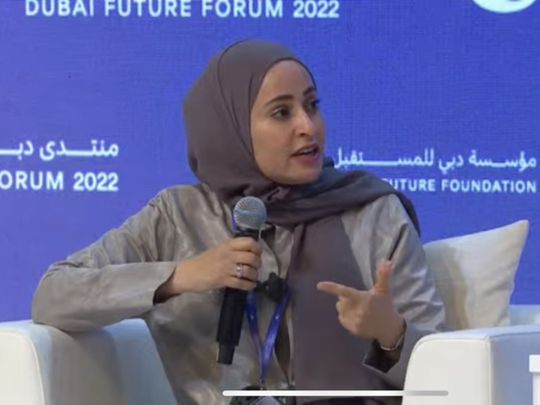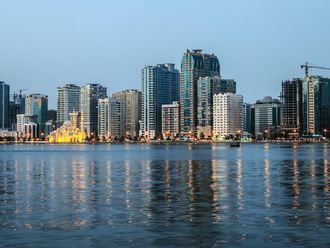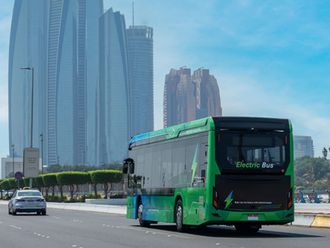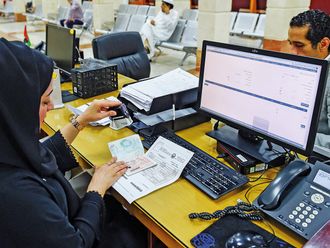
Dubai: The UAE is working on coming up with a second set of law reforms in the country, a minister revealed at the Dubai Future Forum on Wednesday.
Minister of State for Government Development and the Future Ohood Al Roumi made the remarks during a conversation with moderator Jane Witherspoon on how can governments can regulate future trends and technologies.
Al Roumi said the UAE had launched the largest regulatory reforms in the country when it celebrated its Golden Jubilee last year.
“And we are working on a new second set of laws and regulations because we know the power of laws and regulations in ensuring the competitiveness of our nation going into the future,” she said.
‘Year of the 50th’
The UAE came up with wide-ranging reform of the country’s legal system, which aims to strengthen economic, investment and commercial opportunities, in addition to maximising social stability, security and ensuring the rights of both individuals and institutions.
The amendments came during the ‘Year of the 50th’ (in 2021) and are intended to keep pace with the developmental achievements of the UAE and reflect the country’s future aspirations. Over 40 laws were included in the changes, which together represent the largest legal reform in the young nation’s 50-year history.
also read
- UAE’s new and old labour laws compared: What are the main changes?
- UAE’s new law to hire domestic help: What has changed
- UAE’s unemployment insurance for federal government staff comes into force
- 60 per cent of your ‘subscription salary’ for three months after losing job: New UAE Unemployment Insurance Scheme explained
‘Mega project’
On Wednesday, the minister also highlighted the need to upskill government officials to understand the emerging sectors and technological advancements.
“In the UAE, we are aware of that. We are launching very soon a mega project, an initiative to upskill the whole government, starting from our leaders, to policymakers to legislators so they can understand the new sectors…they are setting new types of work…they understand the technologies,” she said.
New forum at WGS
Talking about how the UAE government collaborates with global partners, Al Roomi said the annual World Government Summit is a perfect platform for global collaboration.
She announced that there will be a new forum within the World Government Summit, coming up in February 2023, about “regulating the future.”
“Governments need to work together to find the solutions, the answers. Nobody has the answers yet. And then there is an opportunity on the global scene where governments can come together with tech firms and legislators with international organisations to help revive the laws and regulations. And I think the World Government Summit is an excellent platform to continue the discussion.”
The minister invited the futurists and foresight leaders participating in the Dubai Future Forum to join the conversation.
“We can we can learn from each other. We can find a way to create a better future for our people,” she said.
Future challenges of laws
Going into the future, Al Roumi noted that laws and regulations will become more important as they would be enablers for the new sectors and for the new sense of human life.
Talking about challenges with the current laws and regulations, she pointed out that the costs of some laws and regulations are very high and many are outdated.
“The third challenge is the pace and scope that emerging technologies and scientific advancements are moving,” the minister said, noting that the reactive approach to legislation is very slow. “Sometimes by the time you get the legislation and the law, it's already outdated.”
She urged the countries to seize the opportunities in revamping the laws and regulations and finding answers to questions posed by the emerging sectors.
“Right now we know that the competitiveness of nations is linked to their legal system, their laws and regulations. And going into the future, it will be more important because rules and regulations in any country will determine how successful they will be in attracting talent and investment, creating new sectors.”
Time-bound laws for uncertain future
Talking about the uncertain future where things are evolving very quickly, Al Roumi said: “We might not define the future very precisely but at least we know the trends and we need to be ready for them.
This means that our legislations and laws need a different look. We need innovative, agile and flexible frameworks.”
While the word experiment is perceived as not so government-friendly, she pointed out that many governments around the world are experimenting with laws and regulations in different scopes in formats.
Taking a dig at the privacy policy statements that take up to “18 minutes” to read, the minister said: “We need to innovate in the way we draft laws and regulations. We need to innovate also, in the validation of these rules and regulations. What about having more time-bound laws and regulations that expire? We need to innovate when it comes to governing these laws and regulations in a smart way.”
Regulatory Sandboxes
Al Roomi pointed out that some countries and some companies are experimenting with smart rules and contracts.
“We see an increase in the number of sandboxes Regulatory Sandboxes around the world, whether it is for health, FinTech, AI, data, because they are safe spaces where companies can innovate. If we talk, for example, about FinTech, there are 17 FinTech sandboxes around the world in 50 jurisdictions.”
A regulatory sandbox is a regulatory approach, typically summarised in writing and published, that allows live, time-bound testing of innovations under a regulator's supervision.
Al Roomi cited another example of innovation. “New Zealand and Australia are trying to develop machine-readable laws and regulations. So it's easier to implement in a digital world.”
She also lauded the experiment in Korea where they have designated free zones enabling companies to innovate and disrupt things in certain areas. “So while giving them the freedom, they're also protecting innovation and if they prove to be good, then they can expand beyond those zones.”
UAE’s RegLab
Talking about the innovative approach to regulations in the UAE, the minister pointed out that the country has established a “RegLab that provides an agile environment that brings together legislators and innovators, to experiment with licensing the new technologies or new economic sectors, whether it is driverless cars, drones, AI or data.”
Launched in 2019 in partnership with Dubai Future Foundation, which is organising the Dubai Future Forum, the Regulations Lab (RegLab) is a revolutionary approach of the UAE in the legislation and application of emerging technologies. It works with regulators, the private sector, innovators and business leaders to co-create legislation that is in step with the speed of innovation.
“We need to see more of these innovations to help think of the new framework for laws and regulations around the world,” said Al Roomi.
Governments, enablers of change
Talking about governments as enablers of change, Al Roomi said what matters the most is the mindset.
“We need a different mindset and new skills in order to help us invent the laws and regulations.”
She quoted statistics that said at least 50 per cent of employees in all sectors need upskilling.
“Governments and specifically legislators are not an exception. Let me give you an example about the digital world. Government legislators are in charge of technology. How would we be able to regulate such technologies if we don't understand how we're going to behave as government? How will we be able to unlock the potential of cryptocurrencies, tokenisation if we don't understand that? There is a risk. As governments, we either overregulate and kill innovation, or we don't regulate and we don't protect people,” she said, pointing at the fine line that governments need to tread on.
Regulating the Metaverse
Al Roomi also highlighted the need for governmental bodies to be prepared to handle regulations in the Metaverse.
“If someone harms your avatar in the Metaverse, what would be the implications? Are our ministries of interior and safety ready for that? The digital world has no borders, and usually the laws and regulations are bound to jurisdiction. Where is the jurisdiction in the digital world? These questions have no answers yet and we need to upskill government officials.”
Al Roomi said there is a high responsibility on big tech firms to join hands and help governments around the world to upskill their staff and this is for them benefits.
“The mindset is really important. We need to have collaborative teams working on laws and regulations. This is not the job of legislators only. You need to bring the private sector, you need to bring technology and people to think of different elements of society to think of the different elements.”












